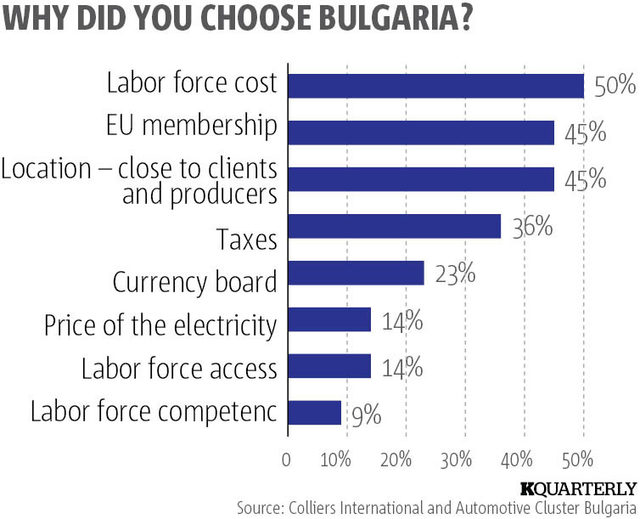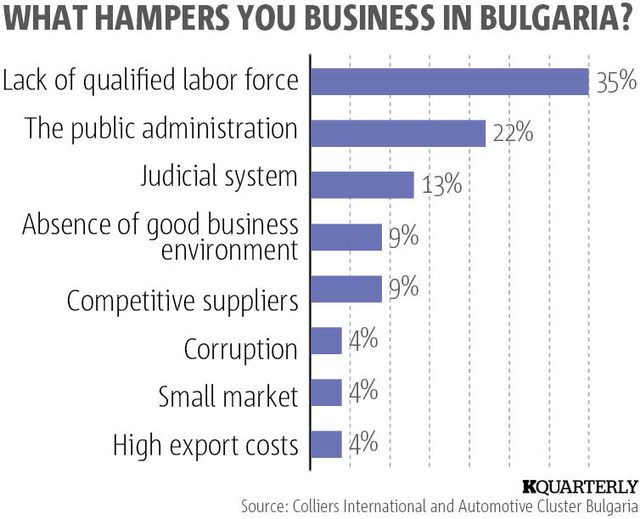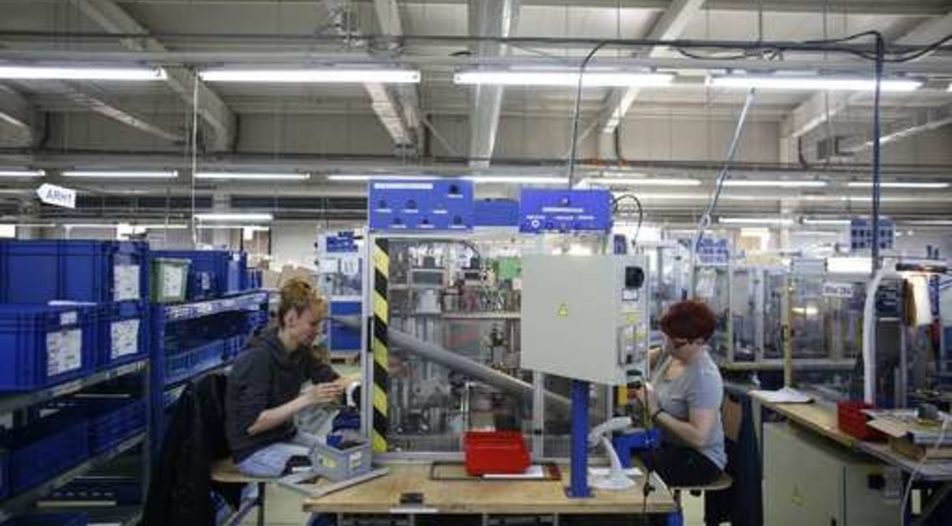Automotive part manufacturers in Bulgaria expect an increase in revenues, staff and investments in 2016. The industry has been one of the best performers recently: last year the 50 or so companies producing auto components only posted 3 billion leva revenues.
The trend for the sector is to continue strengthening in the coming years. However, a crucial factor for that will be staff training and infrastructure development. That emerges from the first survey of the sentiments in the industry conducted by Automotive Cluster Bulgaria and Colliers International.
Strong year 2016
Most of the companies in the sector (59%) expect that the Bulgarian economy will grow in 2016; the share of those projecting an increase in their own revenue is even bigger: 64%. "That is a very strong signal from companies generating 3.5% of the gross domestic product," said Georgi Kirov, Director of Investment Services at Colliers.
The investment plans of enterprises are connected mainly with the purchase of new machines - 59% of them project a rise in equipment spending. The share of those planning bigger investments in real estate is smaller: 27%.
In the medium term, most enterprises plan to expand production in this country and 41% expect to increase their personnel. Since the shortage of qualified staff is a major problem for companies in the sector, most of them solve it by organizing internal trainings.
An important trend for new entrants is their preference of green-field projects - be it building their own plants or renting built-to-suit premises on a long-term basis. In Kirov's words that is typical of the more technologically advanced productions.
Flourishing sector
In recent years, the production of automotive components has turned into a key engine of economic growth and employment in Bulgaria. Currently there are approximately 100 companies operating in the sector, half of them are focused exclusively on the automotive industry and the rest have combined production. As a matter of fact, the mixed-profile enterprises have added automotive part production to their portfolios, encouraged by increased demand and the good opportunities for this business in Bulgaria. For instance , the Greek-owned Etem, which used to manufacture only aluminum profiles and architectural systems now produces aluminum components for chassis, doors, bumper beams etc.
"All in all, the companies working for the automotive industry have a staff of nearly 55,000 and their total output accounts for nearly 6% of the Bulgaria's GDP," Kirov said.


The enterprises that manufacture automotive components are about 50, but provide jobs to 33,000 people. Typically, they are suppliers of global automotive companies and only one has an assembly facility (China's Great Wall).
Companies in Bulgaria manufacture everything from seat covers and seating systems (ALC, Grammer), through instrument panels and climate control systems (Visteon, Behr-Hella), to microelectronic solutions and sensors (Melexis, Festo). The total revenues of the companies that manufacture automotive components only amounted to €1.55 billion in 2015 (3.5% of GDP). There is almost no region in Bulgaria without such a manufacturer. However, most of them (about two-thirds) are concentrated in southern Bulgaria.
Why Bulgaria
it is not surprising that the main reason why companies choose Bulgaria for their new production facilities is the low labor costs, according to the results of the survey conducted among the enterprises manufacturing automotive components. Labor costs in Bulgaria are 10 to 50 times lower than in Western Europe and 30 to 50% lower than in Central and Eastern Europe. Accoridng to Colliers' data the average annual salary in the segment in Bulgaria is €5,100, i.e. about 830 leva per month. "That is above the average wage but it is not a poorly-paid job in the Bulgarian context," Kirov added. However, the shortage of qualified workforce is the major problem for investors, which means additional costs for staff training.
EU membership is another advantage, mainly because Bulgaria's main rival in attracting automotive investors is Serbia, which has not yet joined the EU.
Bulgaria is also a competitive destination in relation to construction costs and electricity prices. Even though these parameters are close to those in Central and East Europe, Bulgaria has a considerable advantage compared to Western Europe.
Iglika Philipova is editor with Capital
Automotive part manufacturers in Bulgaria expect an increase in revenues, staff and investments in 2016. The industry has been one of the best performers recently: last year the 50 or so companies producing auto components only posted 3 billion leva revenues.
The trend for the sector is to continue strengthening in the coming years. However, a crucial factor for that will be staff training and infrastructure development. That emerges from the first survey of the sentiments in the industry conducted by Automotive Cluster Bulgaria and Colliers International.












